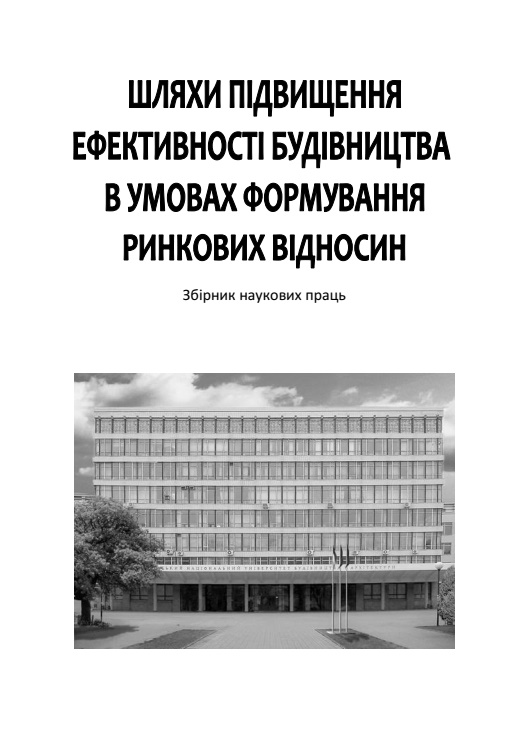Theoretical and applied principles of energy-efficient building: an economic aspect
DOI:
https://doi.org/10.32347/2707-501x.2015.33.69-79Keywords:
"passive" house, "green" economy, sustainable development construction companies, energy saving.Abstract
In the article the development and implementation of modern concepts of energy efficiency in construction "passive" house and "Triple Zero". On the basis of "green" economy singled features passive construction in the perspective of its structural components: economic, environmental and social. In order to popularize energy-efficient construction in Ukraine are examples of enforcement in European countries; are the main advantages and disadvantages.
References
Архитектура трех нулей от Верена Зобека /[Электронный ресурс]. - Режим доступа: http://rodovid.me/green_city/arhitekutra-treh-nuley-ot-verena-zobeka.html
Гоц В.В. Управління інформацією по фазам життєвого циклу девелоперського проекту / В.В. Гоц // Управління розвитком складних систем. – 2012. – Вип. 9. – С. 30 – 35.
Долінський А.А. «Енергозбереження та екологічні проблеми енергетики» /А.А. Долінський // Вісник НАН України. – 2006. – №2. – С. 23-28.
Енергозбереження у житловому фонді: проблеми, практика, переспективи: Довідник «НДІ проектреконструкція», Deutsche Energie-Agentur GmbH(dena), Instituts Wohnen und Umwelt GmbH– 2006. – 144c.
Принципи пасивної будівлі для енергоефективних шкіл. – К. : ВБО «Глобальна синергія», 2013. – 16 с.
Савицкий Н.В. Основные принципы методики рационального проектирования жилых зданий / Савицкий Н.В. Швец Н.А., Шляхов К.В., Юрченко Е.Л. // Международный научно-технический сборник: Научно-технические проблемы современного железобетона; - Вып. 62, книга 2 – К.: 2005. – С. 292 – 295.
Саницький М.А. Проблеми енергозбереження в сучасному житлово-цивільному будівництві / М.А. Саницький, О.Р. Позняк, У.Д. Маруак // Міжвідомчий науково-технічний збірник «Будівельні конструкції» – 2005 – Випуск 63 – С. 234 – 239.
Стандарт будівлі «Пасивний дім» / [Електронний ресурс]. - Режим доступу: www.pro-passivhaus.com
Степаненко О.І. Пасивний будинок – шлях до ефективного використання енергії / О.І. Степаненко, В.В. Дубровська // Енергетика: економіка, технології, екологія. - №3 - Київ, 2014. – С. 56-58.
Файст В. «Основы проектирования пассивных домов» / В. Файст // Издательство АСВ, – М.: –2008. – 140 с.
Cost optimal and nearly zero (nZEB) energy performance calculations for residential buildings with REHVA definition for nZEB national implantation / J. Kurnitski, A. Saari, T. Kalamees еt al. // Energy and building. – 2011. – No 43. – P. 3279-3288.
Feist W. Das kostengünstige Passivhaus — Proektbeschreibung / W. Feist // Arbeitkreis kostengünstige Passivhäuser. Protokolband № 1. Darmstadt, 1996. S. 9–21.
Green Growth Strategy Interim Report: Implementing Our Commitment for a Sustainable Future [C/MIN(2010)5, Paris, 27-28 May 2010]. - [Електронний ресурс]. - Режим доступу: www.oecd.org/greengrowth.
UNIDO, General Conference Thirteenth session, Vienna, 7-11 December 2009 Forum on industrial development issues Issues paper by the Secretariat Distr.: General 28 October 2009. – С.6.
Sekret, R. Relation between energy characteristics and cost for single family buildings / Sekret R., Sanytsky M., Wojcikewicz M. // Рroceedings of the 4th International conference on contemporary problems in architecture and construction, September 24-27, 2012. – Czestochowa, 2012. – P. 220 – 226.
Downloads
How to Cite
Issue
Section
License
Copyright (c) 2020 M. Klymchuk

This work is licensed under a Creative Commons Attribution 4.0 International License.
Authors who publish with this journal agree to the following terms:
- Authors retain copyright and grant the journal right of first publication with the work simultaneously licensed under a Creative Commons Attribution License that allows others to share the work with an acknowledgement of the work's authorship and initial publication in this journal.
- Authors are able to enter into separate, additional contractual arrangements for the non-exclusive distribution of the journal's published version of the work (e.g., post it to an institutional repository or publish it in a book), with an acknowledgement of its initial publication in this journal.
- Authors are permitted and encouraged to post their work online (e.g., in institutional repositories or on their website) prior to and during the submission process, as it can lead to productive exchanges, as well as earlier and greater citation of published work (See The Effect of Open Access).

